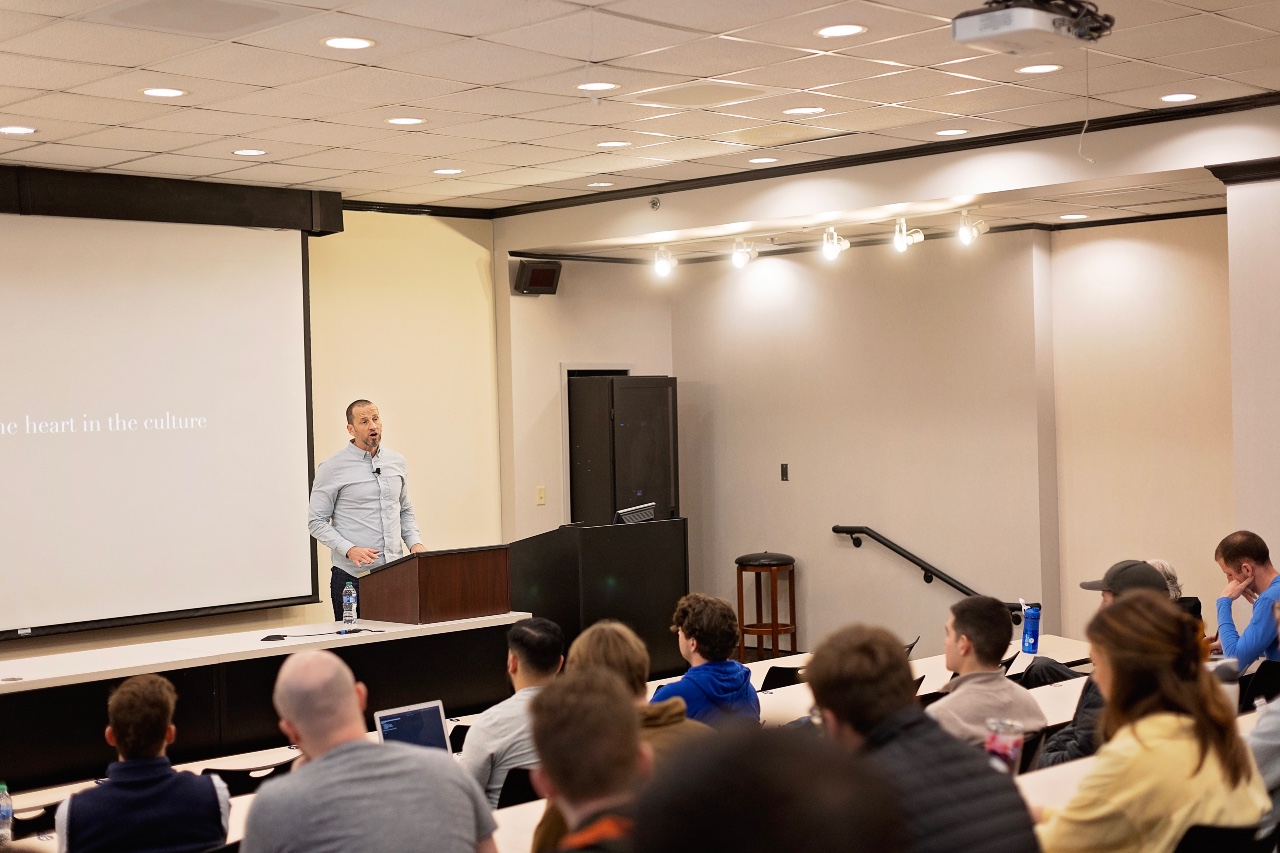
Christians still have “the best story to tell,” said Jeremy Treat, pastor for preaching and vision at Reality Church of Los Angeles, during the recent Conger Biblical Preaching Lectures, held at Samford University’s Beeson Divinity School.
In a post-Christian world filled with false narratives and idols, Christians have the opportunity to show those who are lost the hope of Jesus Christ and how He satisfies our every longing, Treat said.
Treat preached at Beeson’s weekly chapel service on Feb. 6, followed by lectures on both Feb. 7 and 8. In his chapel message, Treat walked through the apostle Paul’s address to non-Christians in Athens as described in Acts 17, emphasizing the need for “subversive fulfillment.”
Rather than trying to win an intellectual argument, subversive fulfillment aims to affirm human longings, such as the need for love and relationship, or the need to have a meaning in life, while pointing out how the world’s answers to these longings fails, and how Christ alone can meet our needs, Treat said.
In his first lecture, Treat taught a theology of preaching for a post-Christian society. Recalling his experience living and ministering in Los Angeles, Treat said it dawned on him one day that “God’s Word is the same, but I am in a completely different context.”
“We are no longer in Jerusalem,” Treat said. “We are in Babylon.”
Our post-Christian society is marked by a distrust of authority, new digital technologies, a diversity of culture and divisive politics, according to Treat. In this new context, Christians must think carefully about what preaching is and how to do it well.
“I don’t think we need to reinvent preaching, but I do believe that we need to revive preaching and retrieve it from watered-down, entertainment-driven, don’t offend at all costs, consumeristic forms of preaching,” Treat said. “We need preaching that is grounded in Scripture, aimed at discipleship, socially aware, sensitive to wounds and centered on the good news of Jesus Christ.”
Treat reminded those gathered the power of preaching is in God, not the preacher. Biblically, God has always accomplished His purposes in the world through His Word, Treat argued, and the preaching of God’s Word has been the God-ordained means of revealing Himself as the Holy Trinity and meeting with His people. Quoting D.A. Carson, Treat said preaching is the “re-revelation of God.” And for pastors, preaching is a means of shepherding the church, he said.
Preachers must be aware of culture and how those outside the church understand Scripture and how different cultural backgrounds can impact understanding, Treat said. And in an increasingly political world, preachers must be aware of how people are thinking, as so many issues are seen as only political. Messengers of God’s Word must be “for the Kingdom,” not for a political party, Treat emphasized.
In his final lecture, Treat discussed how to preach Christ to the heart in a post-Christian culture, reminding those gathered that the aim is to exalt Christ, not self.
“Preaching Christ means the goal of preaching isn’t for people to leave saying, ‘Wow, what a sermon,’ but, ‘Wow, what a Savior,’” Treat said.
Preachers must learn to get to Christ exegetically from anywhere in Scripture, understanding that the Bible is Christ-centered, and to preach not just doctrines, but Christ Himself, Treat reminded his audience.
Preaching to the heart, Treat said, means focusing not on behavior modification or transfer of information, but on bringing the sinner to the Savior.
Being in the culture means avoiding the dangers of separating from culture as well as synchronizing with it, Treat said. Those who preach must discern culture by understanding its idols, such as fame, inclusivity and sexual liberation, as well as its narratives, like social justice, critical theory and conspiracy theories. Showing how these narratives fail while exalting Christ as better is the work of a preacher, he argued.
Preachers will also need to be able to respond to what Treat called “defeaters,” beliefs that non-Christians have that they believe makes Christianity implausible, such as the hypocrisy of Christians, the relationship between faith and science, and more.
To watch Treat’s chapel message, visit our YouTube channel. To learn more about the Conger lectures, visit our website.
